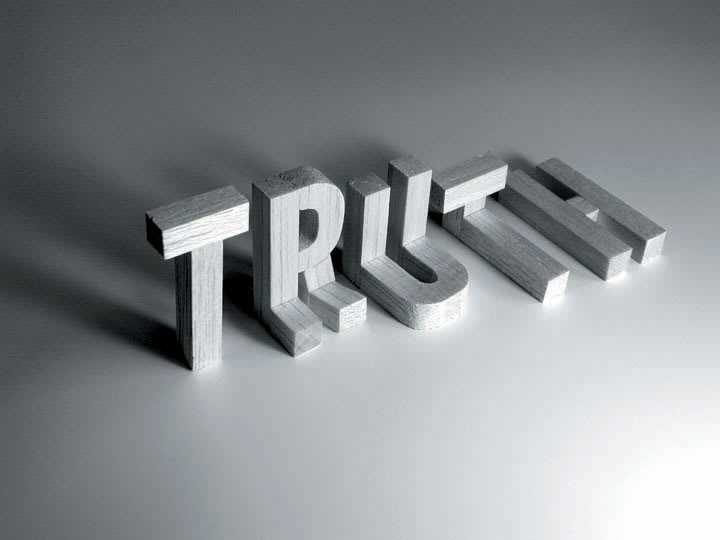THE MATE OF a sailing vessel took a drop too much and became drunk for the first time in his life. The captain recorded in the ship’s log: “Mate drunk today.”
When the mate read the entry he implored the captain to erase it from the record, saying that when it would be seen by the ship’s owners it would cost him his job, and that the captain was well aware that this was his first offense. The captain refused to change his mind and said to the mate, “This is the fact, the truth is the truth, and into the log it goes.”
Some days later, the mate was keeping the log, and he made this entry” “Captain sober today.” The indignant captain protested when he read the record, declaring that it would leave an altogether false impression in the minds of the vessel’s owners as though it was unusual for him to be sober. But the mate answered using the captain’s own words: “This is the fact, the truth is the truth, and into the log it goes.”
Is this in fact the truth? Does every truth go into the log? If the answer is no, what about a lie, does every lie go into the log? We’ve all heard of the half truth, is there also a half lie? Remember the mother who scolded her child saying, “I never want to catch you lying again.” As she was lecturing the child about the evil of lying, her phone rang. “Please answer it,” she told her son, “and if it’s Mrs. Cohen, tell her I am not at home.” Was this mother lying, or simply not telling the truth? Is there a difference? One more question: does the Torah prohibit us from lying, or does the Torah expect more from us? Are we perhaps, expected to also not refrain from the truth?
There are two sources in Torah which prohibit lying. Velo teshakru ish bamito – “Do not lie to one another” in Vayikra (19,11) and in Mishpatim where the Toah doesn’t simply state the prohibition to lie, but rather declares Midvar sheker tirchak, meaning, “You shall distance yourself from anything false.” This means, explains Seforno that one must refrain from saying anything which may be construed as a lie.
The instinctual capacity inherent in every human being to lie was very much on the angels’ minds when G-d was about to create the world. “The ministering angels divided into two parties, “ the Midrash relates. Mercy said: “Create him.” Truth said: “Do not create him, since he is all falsehood.” It’s tough to be honest, always honest! It’s among man’s greatest challenges to make truth an unshakable part of life. It is told of the Ba’al HaTanya that he strove for twenty one years to gain and grasp the truth. Seven years he worked to discover what truth is. Seven years he worked to chase away sheker – falsehood. Finally, for seven years he struggled to integrate truth into his very being.
It’s obvious then, why the Torah would emphatically declare Lo tishakru ish bamito “and deal not falsely with each other.” But, why did the Torah go beyond that and add in Mishpatim, midvar sheker tirchak – “You shall distance yourself from falsehood”? Only regarding lying does Torah use an expression of harchaka, to separate and distance oneself from any form of falsehood. Lying seems to be such an absolute evil, which requires the avoidance not only of the sin itself, but of its distant cousins, as well.
The additional pasuk in Mishpatim refers to the avoidance of half truths, or, if you will, of half lies. Falsehood in Jewish terms means much more than simply not telling the truth. Falsehood connotes anything that runs contrary to wisdom, including ingratitude and misrepresentation. Judaism demands much more than just not being a liar. It demands absolute truth and honesty – without equivocation, negotiation or room for misinterpretation.
Are there however, any circumstances where the waiving of the truth in permitted in the interests of greater values or goals? We are well aware that G-d Himself amended Sarah’s words, for the sake of peace. Sarah said, “My husband is old.” G-d reports her as having said that she was old. This emendation of the truth is viewed as permissible and even commendable “in order to promote peace.” The Talmud derives from here that it is permissible and even a mitzvah to deviate in the interests of peace. Yosef too tells his brothers after Yaakov’s passing, “Your father did command before he died, saying, ‘So shall you say to Yosef, Forgive, I ask you, the transgression of your brothers,’ “ That was truth waived in the interests of peace
What emerges then is a clear picture. It is absolutely forbidden to lie, cheat or deceive. It is absolutely permissible to withhold truth for the sake of the greater good of peace. But it is required and expected to distance oneself from any situation where the truth may be submerged or misconstrued.
No man was more imposed upon by rabbinical authors in search of haskamot and approbations for their books, than the Gaon of Vilna.
One day a pretentious Talmudic scholar asked him for an approbation for his about to be published treatise. The Gaon could not refuse as much as he really wanted to, and wrote a halfhearted testimonial of a few short lines. Although he had plenty of room, he signed his name at the very bottom of the page.
“Why do you sign your name so far from the actual approbation, rabbi” asked the author. The Gaon smiled and replied: “The Torah commands us: Midvar sheker tirchak – keep a distance from falsehood.”
Rabbi Dr. Eliyahu Safran serves as OU Kosher’s Vice President of Communications and Marketing.
The words of this author reflect his/her own opinions and do not necessarily represent the official position of the Orthodox Union.



